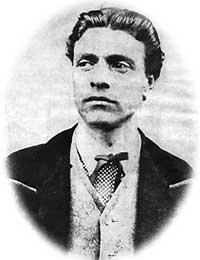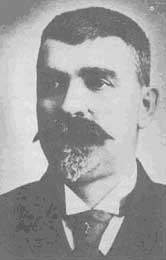Showing posts with label Bulgarian Poets. Show all posts
Showing posts with label Bulgarian Poets. Show all posts
Poets of Sofia - Yavorov
5 минути София - Поетите на София - Яворов / 5 minutes Sofia - Poets of Sofia - Yavorov - YouTube http://buff.ly/1dT2IPh
„Душата ми е стон, душата ми е зов.
Защото аз съм птица устрелена:
на смърт е моята душа ранена,
на смърт ранена от любов."
На Лора
My soul is grief. My soul is call
Because I am a bird picked off.
To death is doomed my wounded soul --
Soul wounded by the love.
To Laura
Labels:
Bulgaria,
Bulgarian Poets,
Sofia
Poem "Levski" from "Epic of the Forgotten" by Ivan Vazov
This is one of the most moving literary works devoted to Vasil Levski, one of Bulgaria's national heroes.
Vasil Levski (Bulgarian: Васил Левски, originally spelled Василъ Львскій, 18 July 1837–18 February 1873), dubbed the Apostle of Freedom, strategised a revolutionary movement to liberate Bulgaria from Ottoman rule.
Ivan Vazov (Bulgarian: Иван Вазов) (June 27, 1850 - September 22, 1921) was one of the most famous Bulgarian poets, novelists and playwrights. He was born in Sopot, a town in the Rose Valley of Bulgaria (then part of the Ottoman Empire).
Ivan Vazov. Image source: Wikipedia, public domain.
Excerpts from the Poem "Levski" from "Epic of the Forgotten" by Ivan Vazov (in Bulgarian)
Девет годин той
скита се бездомен, без сън, без покой,
под вънкашност чужда и под име ново
и с сърце порасло и за кръст готово,
и носи съзнанье, крепост, светлина
на робите слепи в робската страна.
Думите му бяха и прости и кратки,
пълни с упованье и надежди сладки.
Говореше често за бунт, за борба,
кат за една ближна обща веселба,
часът на която беше неизвестен;
изпитваше кой е сърцат, сиреч честен,
участник да стане във подвига свят;
всяк един слушател беше му и брат.
В бъдещето тъмно той гледаше ясно.
Той любеше свойто отечество красно.
Той беше скиталец и кат дете прост
и като отшелник живееше в пост.
Горите, полята познати му бяха;
всичките пътеки кракът му видяха,
пустинята знайше неговия глас,
хижата го знайше и на всеки час
вратата й за него отворена беше.
Той се не боеше, под небето спеше,
ходеше замислен, сам-си без другар.
Тая заран млад е, довечера стар,
одеве търговец, сега просяк дрипав,
кога беше нужно - хром, и сляп, и клипав;
днес в селото глухо, утре в някой град
говореше тайно за ближний преврат,
за бунт, за свобода, за смъртта, за гробът,
и че време веч е да въстане робът;
че щастлив е оня, който дигне пръв
народното знаме и пролее кръв,
и че трябва твърдост, кураж, постоянство,
че страхът е подлост, гордостта - пиянство,
че равни сме всички в големия час -
той внасяше бодрост в народната свяст.
И всякоя възраст, класа, пол, занятье
зимаше участье в това предприятье;
богатий с парите, сюрмахът с трудът,
момите с иглата, учений с умът,
а той беден, гол, бос, лишен от имотът,
за да е полезен дал си бе животът!
Той беше невидим, фантом, или сянка.
Озове се в черква, мерне се в седянка.
Покаже се, скрий се без знак и без след,
навсякъде гонен, всякъде приет.
Веднъж във събранье едно многобройно
той влезна внезапно, поздрави спокойно,
и лепна плесница на един подлец,
и излезе тихо из малкий градец.
Името му беше знак зарад тревога,
властта беше вредом невидима, строга,
обсаждаше двайсет града изведнъж,
да улови тоя демон вездесъщ.
От лице му мрачно всички се бояха,
селяните прости светец го зовяха
и сбрани, сдушени във тайни места
слушаха със трепет, с зяпнали уста
неговото слово сладко и опасно,
И тям на душата ставаше по-ясно.
Click here for the English translation from Slovoto.bg.
References:
Vasil Levski. Wikipedia.
Ivan Vazov. Wikipedia.
Ivan Vazov - The revolutionary poet. Sofia Echo, 2003.
Vasil Levski (Bulgarian: Васил Левски, originally spelled Василъ Львскій, 18 July 1837–18 February 1873), dubbed the Apostle of Freedom, strategised a revolutionary movement to liberate Bulgaria from Ottoman rule.
Photograph portrait of Vasil Levski (1837–73). Image source: Wikipedia, public domain.
Ivan Vazov (Bulgarian: Иван Вазов) (June 27, 1850 - September 22, 1921) was one of the most famous Bulgarian poets, novelists and playwrights. He was born in Sopot, a town in the Rose Valley of Bulgaria (then part of the Ottoman Empire).
Ivan Vazov. Image source: Wikipedia, public domain.
Excerpts from the Poem "Levski" from "Epic of the Forgotten" by Ivan Vazov (in Bulgarian)
Девет годин той
скита се бездомен, без сън, без покой,
под вънкашност чужда и под име ново
и с сърце порасло и за кръст готово,
и носи съзнанье, крепост, светлина
на робите слепи в робската страна.
Думите му бяха и прости и кратки,
пълни с упованье и надежди сладки.
Говореше често за бунт, за борба,
кат за една ближна обща веселба,
часът на която беше неизвестен;
изпитваше кой е сърцат, сиреч честен,
участник да стане във подвига свят;
всяк един слушател беше му и брат.
В бъдещето тъмно той гледаше ясно.
Той любеше свойто отечество красно.
Той беше скиталец и кат дете прост
и като отшелник живееше в пост.
Горите, полята познати му бяха;
всичките пътеки кракът му видяха,
пустинята знайше неговия глас,
хижата го знайше и на всеки час
вратата й за него отворена беше.
Той се не боеше, под небето спеше,
ходеше замислен, сам-си без другар.
Тая заран млад е, довечера стар,
одеве търговец, сега просяк дрипав,
кога беше нужно - хром, и сляп, и клипав;
днес в селото глухо, утре в някой град
говореше тайно за ближний преврат,
за бунт, за свобода, за смъртта, за гробът,
и че време веч е да въстане робът;
че щастлив е оня, който дигне пръв
народното знаме и пролее кръв,
и че трябва твърдост, кураж, постоянство,
че страхът е подлост, гордостта - пиянство,
че равни сме всички в големия час -
той внасяше бодрост в народната свяст.
И всякоя възраст, класа, пол, занятье
зимаше участье в това предприятье;
богатий с парите, сюрмахът с трудът,
момите с иглата, учений с умът,
а той беден, гол, бос, лишен от имотът,
за да е полезен дал си бе животът!
Той беше невидим, фантом, или сянка.
Озове се в черква, мерне се в седянка.
Покаже се, скрий се без знак и без след,
навсякъде гонен, всякъде приет.
Веднъж във събранье едно многобройно
той влезна внезапно, поздрави спокойно,
и лепна плесница на един подлец,
и излезе тихо из малкий градец.
Името му беше знак зарад тревога,
властта беше вредом невидима, строга,
обсаждаше двайсет града изведнъж,
да улови тоя демон вездесъщ.
От лице му мрачно всички се бояха,
селяните прости светец го зовяха
и сбрани, сдушени във тайни места
слушаха със трепет, с зяпнали уста
неговото слово сладко и опасно,
И тям на душата ставаше по-ясно.
Click here for the English translation from Slovoto.bg.
References:
Vasil Levski. Wikipedia.
Ivan Vazov. Wikipedia.
Ivan Vazov - The revolutionary poet. Sofia Echo, 2003.
Интрига лишава Вазов от Нобел. 24Chasa.bg newspaper, 2010 (in Bulgarian).
Expat in Bulgaria.
Epic of the Forgotten. Ivan Vazov. Slovoto: Bulgarian and English.
Expat in Bulgaria.
Epic of the Forgotten. Ivan Vazov. Slovoto: Bulgarian and English.
Lest We Forget | Flickr http://goo.gl/GFOt
Hero | Flickr http://goo.gl/WMYB
Related books:
Related books:
Labels:
Bulgarian History,
Bulgarian Poets
Bulgarian Poets: Hristo Fotev (Bulgarian: Христо Фотев)
Hristo Fotev was born on 25 March 1934, and spent most of his life in Burgas, a city anchored on Black Sea coast of South-Eastern Bulgaria.
References (some in Bulgarian):
Hristo Fotev Stepped in Immortality, Standart News, 2002.
Biography of Hristo Fotev. Slovoto.
Poems of Hristo Fotev. Slovoto.
Poems of Hristo Fotev. Bulgarian National Library.
References (some in Bulgarian):
Hristo Fotev Stepped in Immortality, Standart News, 2002.
Biography of Hristo Fotev. Slovoto.
Poems of Hristo Fotev. Slovoto.
Poems of Hristo Fotev. Bulgarian National Library.
Labels:
Bulgaria,
Bulgarian Poets,
Literature
Bulgarian Poets
 Click below to read the relevant posts from this website:
Click below to read the relevant posts from this website:Valeri Petrov (Bulgarian: Валери Петров)
Petya Dubarova
Hristo Fotev (Bulgarian: Христо Фотев)
Damian Damianov
Evtim Evtimov
Nedialko Iordanov
Petya Dubarova
Hristo Fotev (Bulgarian: Христо Фотев)
Damian Damianov
Evtim Evtimov
Nedialko Iordanov
Image source: Dimcho Debelyanov. Portrait of Dimcho Debelyanov, exhibited in Debelyanov House, in Koprivshtitsa (Bulgaria), Wikipedia, public domain.
Published: 11/29/2009
Updated: 12/27/2009
Labels:
Bulgaria,
Bulgarian History,
Bulgarian Poets,
Literature
Bulgarian Poets: Valeri Petrov (Bulgarian: Валери Петров)
From Wikipedia:
Valeri Petrov (Bulgarian: Валери Петров), pseudonym of Valeri Nisim Mevorah (Валери Нисим Меворах) (born 22 April 1920) is a popular Bulgarian poet, screenplay writer, playwright and translator of paternal Jewish origin.
Born in the capital Sofia to lawyer Nisim Mevorah (and Bulgarian ambassador to the USA in 1945 - 47 and representative to the UN) and high-school French teacher Mariya Petrova, Valeri Petrov studied at the Italian School in the city, finishing in 1939. He graduated in medicine from Sofia University in 1944.
When he was 15, Valeri Petrov published his first book. He served as a doctor in a military hospital and in the Rila Monastery.
Valeri Petrov is particularly esteemed for the quality of his translation of the entire works of Shakespeare.
Collected Poems 1943-2004 By Richard Wilbur:
Valeri Petrov (Bulgarian: Валери Петров), pseudonym of Valeri Nisim Mevorah (Валери Нисим Меворах) (born 22 April 1920) is a popular Bulgarian poet, screenplay writer, playwright and translator of paternal Jewish origin.
Born in the capital Sofia to lawyer Nisim Mevorah (and Bulgarian ambassador to the USA in 1945 - 47 and representative to the UN) and high-school French teacher Mariya Petrova, Valeri Petrov studied at the Italian School in the city, finishing in 1939. He graduated in medicine from Sofia University in 1944.
When he was 15, Valeri Petrov published his first book. He served as a doctor in a military hospital and in the Rila Monastery.
Valeri Petrov is particularly esteemed for the quality of his translation of the entire works of Shakespeare.
Collected Poems 1943-2004 By Richard Wilbur:
Valeri Pterov turned 90 in April 2010. The poem below is among his latest works (in Bulgarian):
(Труд, 16.04.2010 20:24)
Напоследък, признавам си - в мен се ражда една
мисъл, малко себична:
от разрухата в нашата злополучна страна
полза май имам лична.
Какво стана с живота ни! Не ми се говори!
Хитреци, за които вечно няма затвори,
порнографии, подкупи, заплатени убийства,
инсталации, клоуни, идиотски шеги и с това,
дето най ти е мило, дето най ти е скъпо,
словоблудстване тъпо
със велики понятия и прекрасни идеи,
клевети за герои и венци за злодеи,
а не само у нас - по петте континента
се върти тази грозна, отвратителна лента...
И от всичко това, от туй време на злоби
е, уви, мойта полза и тя в туй е, че май,
ако друг бе животът ни, то по-трудно било би,
отколкото днес е, да му кажеш: - Гуд бай!
References:
Valeri Petrov, from Wikipedia, the free encyclopedia.
Translating Shakespeare for the twenty-first century By Rui Manuel G. de Carvalho Homem, A. J. Hoenselaars.
Poems in Sega.bg (in Bulgarian).
Website about Valeri Petrov (in Bulgarian).
Valeri Petrov, from Wikipedia, the free encyclopedia.
Translating Shakespeare for the twenty-first century By Rui Manuel G. de Carvalho Homem, A. J. Hoenselaars.
Poems in Sega.bg (in Bulgarian).
Website about Valeri Petrov (in Bulgarian).
Валери Петров: А още ми се пише. Trud.bg, national newspaper (in Bulgarian).
Old and Young | Flickr http://goo.gl/l9eM
Валери Петров: Усещам ХХI век като голямо изпитание. Spisanie8.bg, 2011.
Labels:
Bulgarian Poets,
Literature
Bulgarian Poets: Radoi Ralin (Bulgarian: Радой Ралин)
From Wikipedia:
Radoy Ralin (Bulgarian: Радой Ралин) (April 23, 1923 - July 22, 2004), born Dimitar Stoyanov (Bulgarian: Димитър Стоянов), was a famous Bulgarian dissident, poet, and satirist.
His works have been translated into 37 languages.
Radoy Ralin, in memoriam, 2004 (PDF).
References:
Radoi Ralin in The Columbia guide to the literatures of Eastern Europe since 1945 By Harold B. Segel.
Radoi Ralin - Much-loved Bulgarian satirist who gave expression to his dissidence in epigrams, novels, poems and plays. The Times, 2004.
Radoy Ralin (Bulgarian: Радой Ралин) (April 23, 1923 - July 22, 2004), born Dimitar Stoyanov (Bulgarian: Димитър Стоянов), was a famous Bulgarian dissident, poet, and satirist.
His works have been translated into 37 languages.
Radoy Ralin, in memoriam, 2004 (PDF).
References:
Radoi Ralin in The Columbia guide to the literatures of Eastern Europe since 1945 By Harold B. Segel.
Radoi Ralin - Much-loved Bulgarian satirist who gave expression to his dissidence in epigrams, novels, poems and plays. The Times, 2004.
Labels:
Bulgarian Poets,
Literature
Bulgarian Poets: Elisaveta Bagryana (Bulgarian: Елисавета Багряна)
 From Wikipedia:
From Wikipedia:Elisaveta Bagryana (Bulgarian: Елисавета Багряна) (April 16, 1893 – March 23, 1991), born Elisaveta Belcheva (Bulgarian: Елисавета Белчева), was a Bulgarian poet who, along with Dora Gabe (1886-1983), is considered one of the major Bulgarian female poets.
It was after World War I ended, that she truly entered into the literary world, and with the arrival of her first book, The Eternal and the Holy (Vechnata i svyatata, 1927), she earned the confirmation of her peers. She also started writing children stories.
Her works have been translated into over 30 languages. She was nominated for a Nobel Prize.
Selected verses from her poem Descendant are shown below, in Bulgarian:
Потомка (in Bulgarian, English translation: Descendant), from Slovo.bg
Няма прародителски портрети,
ни фамилна книга в моя род
и не знам аз техните завети,
техните лица, души, живот.
Може би прабаба тъмноока,
в свилени шалвари и тюрбан,
е избягала в среднощ дълбока
с някой чуждестранен, светъл хан.
Конски тропот може би кънтял е
из крайдунавските равнини
и спасил е двама от кинжала
вятърът, следите изравнил.
Затова аз може би обичам
необхватните с око поля,
конски бяг под плясъка на бича,
волен глас, по вятъра разлян.
References:
Elisaveta Bagriana, Wikipedia.
Elisaveta Bagryana in The Columbia literary history of Eastern Europe since 1945 By Harold B. Segel.
Elisaveta Bagryana in Who's who in twentieth-century world poetry By Mark Willhardt, Alan Michael Parker.
Image source: Elisaveta Bagriana, Wikipedia.
Labels:
Bulgarian Poets,
Literature
Bulgarian Poets: Dora Gabe (Bulgarian: Дора Габе)
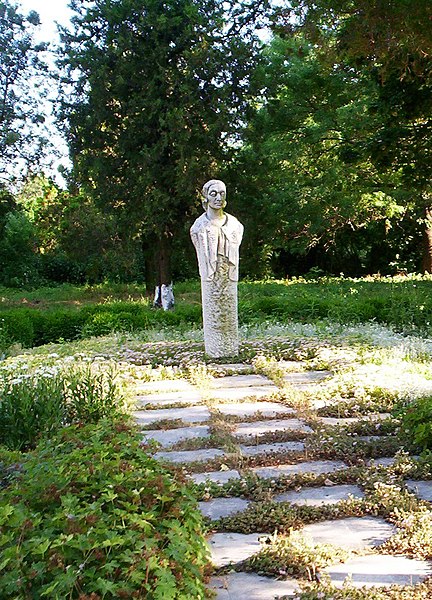 From Wikipedia:
From Wikipedia:Dora Gabe (Bulgarian: Дора Габе, 26 August 1886–16 November 1983) was а Bulgarian poetess. She published poetry for adults and children, as well as travel books, short stories and essays.
Gabe was born in the village of Dabovik near Varna to the family of Peter Gabe, a Russian immigrant. She studied natural science at the University of Sofia, French philology in Geneva and graduated from the University in Grenoble. Among her best-known works are Wait, Sun, Invisible eyes and The world is a secret. After 1917, Gabe translated a large number of foreign books. She died at the age of 95.
The poem "Pибари" ("Fishermen") in Bulgarian, from Slovo.bg
Водата е спокойна, тъмносиня
и лодката оставя светла диря.
Последния летовник си замина
и опустя, затихна манастиря.
Сега е морския шум ясен и по-близък,
вълната плитко в пясъка разляна,
а на скалата, в каменната хижа,
рибарската дружина е събрана.
Широко и безгрижно е запяла
от своя кът, тъй малък и тъй тесен,
над хижата минава ято закъсняло,
заслушано в рибарската и песен.
...
Морето се размъти, вятър духа,
рибарите затегнаха даляни.
Ще трябва вече да вървим оттука
И лястовиците за път са сбрани.
Къде ще идем? Свят широк, далечен,
а водната пустиня е безкрайна.
И кораба - и той замина вече,
като мираж далечен, като тайна.
Тъй малки бяха дните ни, тъй къси,
изпратиха ни с лодката рибари
и ги пое морето във дъха си
като деца и братя, и другари.
References:
Dora Gabe. Wikipedia.
Дора Габе. Wikipedia (in Bulgarian).
Books:
Dora Gabe in New Directions in Prose and Poetry 45 By James Laughlin.
Дора Габе in Христоматия за 3. клас. Литературен калейдоскоп By Нели Иванова, Лилия Черкезова (in Bulgarian).
Image source: The monument of the poet Dora Gabe, village Dabovik, Bulgaria. Wikipedia, Parvev, public domain.
Labels:
Bulgarian Poets,
Literature
Bulgarian Poets: Pencho Slaveykov (Bulgarian: Пенчо Славейков)
 From Wikipedia:
From Wikipedia:Pencho Slaveykov (Bulgarian: Пенчо Славейков) (27 April 1866 – 10 June 1912) was a Bulgarian poet and the youngest son of the writer Petko Slaveykov.
He was born in Tryavna during the Bulgarian National Revival under Ottoman rule. After an accident in January 1884 he fell ill (possibly from polio), and despite lengthy treatments in Bulgaria and abroad, he was left with serious impairments - he could not walk without a cane, and he wrote and spoke with difficulties. He suffered from "melancholic episodes, which forced him to find a cure in literature."
He was a director of the Bulgarian National Theatre (1908–1909) and a director of the National Library of Bulgaria (1909–1911).
He was fired from the post of director of the National Library because of political conflict with the minister of culture, and left Bulgaria, living in Switzerland before moving to Italy. He remained in Rome for three months, but set off in May 1912 to travel through the mountains looking for a cure. He arrived in the small town of Brunate near Lake Como, where he died on 28 May (10 June of Gregorian calendar).
Slaveykov was buried in Brunate's cemetery and his remains were moved to Bulgaria in 1921. Due to his death, the suggestion by Swedish professor Al. Jensen that Slaveykov be awarded a Nobel Prize was not considered by the Nobel Prize committee.
Slaveykov is portrayed on the obverse of the Bulgarian 50 levs banknote (1999 and 2006).
Pencho Slaveykov (left sculpture) and his father Petko (right sculpture) on Slaveykov Square in Sofia.
Престана поройния дъжд (poem, in Bulgarian)Pencho Slaveikov in Bulgaria, a travel guide By Philip Ward:
Престана поройния дъжд,
отмина вихра ненадеян;
гръмовний сетен ек заглъхва,
далеко някъде отвеян.
И само капчици се ронят
от листовцете разведрени,
и падат — благодатни сълзи,
от блясък слънчев позлатени.
Pencho Slaveykov in Merriam-Webster's encyclopedia of literature By Merriam-Webster, Inc:
References:
Pencho Slaveykov, Wikipedia, the free encyclopedia.
Image source: Pencho Slaveykov. Wikipedia, public domain.
Category: Bulgarian poets. Wikipedia.
Photos from MuseumSlaveykovi.org.
Publications at Slovo.bg (in Bulgarian).
Labels:
Bulgaria,
Bulgarian Poets,
Literature
Bulgarian Poets: Dobri Chintulov (Bulgarian: Добри Чинтулов)
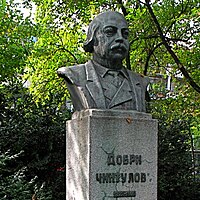 From Wikipedia:
From Wikipedia:Dobri Chintulov (Bulgarian: Добри Чинтулов) (1822 – 27 March 1886) was a Bulgarian poet, teacher and composer of the Bulgarian National Revival period.
Born in the Thracian town of Sliven in September 1822 to the family of a craftsman, Chintulov studied at the Greek school in his hometown, he also received education in Romania and Russia. Chintulov wrote a number of patriotic and revolutionary songs and poems, some of which became renowned as anthems of the liberation of the Bulgarians from the Ottoman Empire.
Chintulov worked as a teacher for years, but had to quit due to problems with his sight. Although ill and half-blind, Chintulov was among those who welcomed the liberating Russian forces in Sliven during the Russo-Turkish War of 1877–1878. Receiving a pension until the end of his life, Chintulov died in Sliven on 27 March 1886, disappointed with the post-Liberation reality.
Chintulov's poetic legacy is not large in numbers, as only around 20 of his poems have survived, he had to burn his manuscripts twice. Three of his best known works are "Rise Up, Rise Up, Balkan Hero", "The Wind is Resounding, the Mountain is Moaning", and "Where are you, Faithful Love of the People?"
In Bulgarian:
Стани, стани юнак балкански (Rise Up, Rise Up, Balkan Hero)
Стани, стани юнак балкански
от сън дълбок се събуди,
срещу народа отомански
ти българите поведи!
Song video: Стани, стани юнак балкански (Rise Up, Rise Up, Balkan Hero)
Вятър ечи, Балкан стене (The Wind is Resounding, the Mountain is Moaning)
Вятър ечи, Балкан стене,
сам юнак на коня
с тръба зове свойте братя:
всички на оръжие!
Song video: Вятър ечи, Балкан стене (The Wind is Resounding, the Mountain is Moaning)
References:
Dobri Chintulov. Wikipedia.
Image source: Dobri Chintulov. Wikipedia, Михал Орела, Creative Commons Attribution 3.0 Unported License.
Dobri Chintulov in Bulgaria By R. J. Crampton.
Dobri Chintulov in A short history of modern Bulgaria By R. J. Crampton.
Labels:
Bulgaria,
Bulgarian Poets,
Literature
Bulgarian Poets: Georgi Dzhagarov (Bulgarian: Георги Джагаров)
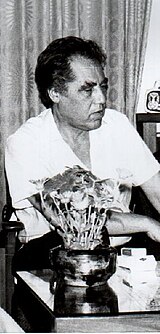 From Wikipedia:
From Wikipedia:Georgi Dzhagarov (Bulgarian: Георги Джагаров) (14 July 1925-1995) was a Bulgarian playwright, poet and politician.
Dzhagarov's most famous poem is devoted to his home country of Bulgaria: "A land like the palm of my hand."
България (in Bulgarian)
Земя като една човешка длан...
Но по-голяма ти не си ми нужна,
Щастлив съм аз, че твойта кръв е южна,
че е от кремък твоят стар Балкан.
Какво, че виха вълци и чакали
из твоите полета и гори?
С онез, които бяха с теб добри,
ти бе добра, но злите не пожали.
Земя, като една човешка длан...
Но счупи се във тази длан сурова
стакана с византийската отрова
и кървавия турски ятaгян.
Търговци на тютюн и кръв човешка
продаваха на дребно твойта пръст,
но паднаха под теб с пречупен кръст,
че беше малка ти, но беше тежка.
И стана чудо: смертю смерт поправ,
усмихнаха се чардаклии къщи
и заплющяха знамена могъщи,
и път се ширна – радостен и прав.
Сега цъфтиш! Набъбва чернозема
под ласкавите български ръце,
дъхти на здравец твоето лице
и нова песен вятърът подема
Земя, като една човешка длан...
Но ти за мен си цяло мироздание,
че аз те меря не на разстояние,
а с обич, от която съм пиян!
During his lifetime, there were rumors that Georgi Dzhagarov was a heavy drinker but this had not affected his literature work. He died from pancreatic cancer in 1995.
References:
Newspaper Segabg.com and part 2 (in Bulgarian).
Image source: Wikipedia, Creative Commons license.
Newspaper Segabg.com and part 2 (in Bulgarian).
Image source: Wikipedia, Creative Commons license.
Updated: 04/17/2010
Labels:
Bulgarian Poets,
Literature
Bulgarian Poets: Nikola Vaptsarov (Никола Вапцаров)
 From Wikipedia:
From Wikipedia:Nikola Vaptsarov (Bulgarian: Никола Вапцаров) (7 December 1909 - 23 July 1942) was a Bulgarian poet and revolutionary. He was born in Bansko and trained as a machine engineer at the Naval Machinery School in Varna, later Naval Academy. Vaptsarov worked machinist jobs most of his life and wrote in his spare time. His only released book of poetry is Motoring Verses (1940). Because of his underground activity against the government of Boris III and the German troops in Bulgaria, he was arrested in March 1942. The court imposed the death penalty on July 23, 1942, Vaptsarov wrote his last poem at 2 pm and was executed by a firing squad the same evening at age of 33.
His poetry has been translated in 98 languages throughout the world. Vaptsarov Peak in eastern Livingston Island, Antarctica is named after the famous Bulgarian poet.

Vaptsarov Peak on Livingston Island, Antarctica. The peak is named after the famous Bulgarian poet Nikola Vaptsarov (1909-42). Image source: Wikipedia, GNU Free Documentation License.
The first verse of the poem Spring (in Bulgarian, source: slovo.bg):
Пролет
Пролет моя, моя бяла пролет,
още неживяна, непразнувана,
само в зрачни сънища сънувана,
как минуваш ниско над тополите,
но не спираш тука своя полет.
English translation: Spring
Spring of mine, O spring of mine so white,
as yet unlived, as yet unfeasted,
alone in visions vague yet dreamt of,
how low above the poplars do you skim,
yet without pausing in your flight.
Video: Margret Nikolova - Prolet moya (1971) (in Bulgarian).
Прощално (in Bulgarian)
На жена ми
Понякога ще идвам във съня ти
като нечакан и неискан гостенин.
Не ме оставяй ти отвън на пътя –
вратите не залоствай.
Ще влезна тихо. Кротко ще приседна,
ще вперя поглед в мрака да те видя.
Когато се наситя да те гледам –
ще те целуна и ще си отида.
English translation: On Parting (A Farewell)
To My Wife
Sometimes I'll come when you're asleep,
An unexpected visitor.
Don't leave me outside in the street.
Don't bar the door!
I'll enter quietly, softly sit.
And gaze upon you in the dark.
Then when my eyes have gazed their fill,
I'll kiss you and depart.
Vaptsarov's last poem, written hours before his death:
Борбата е безмилостно жестока... (in Bulgarian)
Борбата е безмилостно жестока.
Борбата както казват, е епична.
Аз паднах. Друг ще ме смени и...
толкоз.
Какво тук значи някаква си личност?!
14 ч. – 23.07.1942 г.
English translation: The fight is hard and pitiless
The fight is hard and pitiless
The fight is epic, as they say.
I fell. Another takes my place -
Why single out a name?
2 PM, 23 July 1942
Nikola Vaptsarov in Rough guide to Bulgaria By Jonathan Bousfield, Dan Richardson:
Bansko (Bulgarian: Банско) is a town in southwestern Bulgaria, located at the foot of Pirin at an altitude of 925 m above sea level. It is considered to be the most developed Ski and Winter Resort in Eastern Europe, and one of the best in Europe. Bansko is the birthplace of 20th century Bulgarian poet Nikola Vaptsarov and Bulgarian enlighteners Paisiy Hilendarski and Neofit Rilski.
Image source: Vaptsarov as a sailor in Varna, Wikipedia, public domain.
Labels:
Bulgarian Poets,
Literature
Bulgarian Poets: Hristo Botev (Христо Ботев)
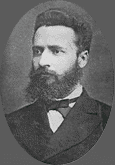 From Wikipedia:
From Wikipedia:Hristo Botev (Bulgarian: Христо Ботев, also transliterated as Hristo Botyov) (January 6, 1848 – June 2, 1876), was a Bulgarian poet and national revolutionary. Botev is widely considered by Bulgarians to be a symbolic historical figure and national hero.
Botev was born in Karlovo. His father, Botyo Petkov (1815–1869), was a teacher and one of the most significant figures of the late period of the Bulgarian National Revival towards the end of the Ottoman rule. In 1863, after completing his elementary education in Kalofer, Botev was sent by his father to a high school in Odessa. While there, he was deeply impressed by the work of the liberal Russian poets of the day.
In May 1876, Hristo Botev came to the April Uprising rebels' rescue with a detachment of Bulgarian political emigrees resident in Romania, ending with the unit's rout (and Botev's death at the age of 28).
One of Botev's best known poems is Hadzhi Dimitar (Хаджи Димитър), written to honor Dimitar Nikolov Asenov (10 May 1840 – 18 July 1868), better known as Hadzhi Dimitar (Хаджи Димитър) was one of the most prominent Bulgarian voivods and revolutionary workers for the Liberation of Bulgaria from Ottoman rule. The most famous couplet from the poem probably is (in Bulgarian):
Настане вечер – месец изгрее,
звезди обсипят сводът небесен;
гора зашуми, вятър повее, –
Балканът пее хайдушка песен!

Hadzhi Dimitar (Хаджи Димитър). Image source: Wikipedia, public domain.
The city of Botevgrad in Bulgaria is named after Hristo Botev.
The monument of Hristo Botev in Botevgrad, Bulgaria.
A monument depicting the scene from Hadji Dimitar with the three fairies tendering the wounded rebel's wounds.
References
HristoBotev.com (in Bulgarian).
Videos (in Bulgarian)
Христо Ботев - "Великите българи" 1 of 3.
Христо Ботев - "Великите българи" 2 of 3.
Христо Ботев - "Великите българи" 3 of 3.
Хаджи Димитър.
Жив е той , жив е! / Jiv e toi, jiv e!
2 Юни, Ден на Христо Ботев.
Related reading
http://www.nationalgeographic.bg/?cid=101&article=4829
Strannopriemnicata.wordpress.com ("virtual museum").
Image source: Hristo Botev, Bulgarian revolutionary and poet, Wikipedia, public domain.
Hristo Botev in Bulgaria: The Bradt Travel Guide By Annie Kay:
Hristo Botev in Bulgaria By Richard Watkins, Christopher Deliso:
Labels:
Bulgaria,
Bulgarian Poets,
Literature
Bulgarian Poets: Lyuben Karavelov (Любен Каравелов)
 From Wikipedia:
From Wikipedia:Lyuben Karavelov (Bulgarian: Любен Каравелов) (c. 1834 - 21 January 1879) was a Bulgarian writer and an important figure of the Bulgarian National Revival. During this period, Bulgaria was under Turkish rule. At his first newspaper Svoboda (Freedom) in Bucharest (1869–1873), we worked and became friends with poet and revolutionary Hristo Botev who devoted a poem to him. In 1870, Karavelov was elected chairman of the Bulgarian Revolutionary Central Committee, where he worked with Vasil Levski, the leader of the Internal Revolutionary Organization. Karavelov admired the political systems of Switzerland (which he believed was the model for the ethnically diverse Balkans) and the United States; and he praised the American public education system.
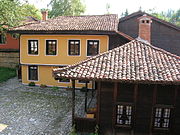
Karavelov House, in Koprivshtitsa. Image source: Wikipedia, public domain.
Following the capture and execution of Levski in 1873, the disheartened Karavelov gradually abandoned his revolutionary zeal, attracting Botev's severe criticism, and started publishing a new Znanie (Knowledge) journal and popular science books. Karavelov died in 1879, soon after the liberation of Bulgaria, in Rousse.
One of Lyuben Karavelov's most famous works (in Bulgarian and English) is shown below, source: Slovo.bg. The English translation is unofficial and uses abbreviations in the style of text messaging.
Хубава си, моя горо (My Forest, You Are Lovely)
Хубава си, моя горо,
миришеш на младост,
но вселяваш в сърцата ни
само скръб и жалост:
който веднъж те погледне,
той вечно жалее,
че не може под твоите
сенки да изтлее,
а комуто стане нужда
веч да те остави,
той не може, дорде е жив,
да те заборави.
Хубава си, моя горо,
миришеш на младост,
но вселяваш в сърцата ни
само скръб и жалост,
твойте буки и дъбове,
твойте шуми гъсти
и цветята, и водите,
агнетата тлъсти,
и божурът, и тревите,
и твойта прохлада,
всичко, казвам, понякогаш
като куршум пада
на сърцето, което е
всякогаш готово
да поплаче, кога види
в природата ново,
кога види как пролетта
старостта изпраща
и под студът, и под снегьт
живот се захваща.
("Знание", г. I, кн. 9, 15 май 1875)
Video: Hubava Si, Moya Goro (My Forest, You Are Lovely).
Lyrics: Hubava Si, Moya Goro (My Forest, You Are Lovely)
in Bulgarian alphabet
in Bulgarian
in English
Хубава си, моя горо,
hubava si moia goro
U r beautiful my forest
миришеш на младост,
mirishesh na mladost
u smell of youth
но вселяваш в сърцата ни
no vseliavash v sartzata ni
but u inspire in our hearts
само скръб и жалост.
samo skrab i zhalost
only sorrow and sadness
Който веднъж те погледне,
koito vednazh te pogledne
who looks at u only once
той вечно жалее,
toi vechno zhalee
he aslways sorrows
че не може под твоите
che ne mozhe pod tvoite
that he can’t under urs
сенки да изтлее.
senki da iztlee
shadows to wither away
А комуто стане нужда
a komuto stane nuzhda
and who becomes necessary to
веч да те остави,
vech da te ostavi
leave u forever
той не може, дорде е жив,
toi ne mozhe dorde e zhiv
he can’t until he’s alive
да те заборави.
da te zabravi
to forget u
Твоите буки и дъбове,
tvoite buki i dabove
ur beech-trees and oak-trees
твоите шуми гъсти,
tvoite shumi gasti
ur thick foliage leaves
и цветята и водите,
chvetiata i vodite
the flowers and the waters
агнетата тлъсти, и божурът, и тревите
agnetata tlasti,i bozhurat,i trevite
the fat lambs, and the globe flower, and the grasses
и твойта прохлада,
i tvoita prohlada
and ur coolness
всичко, казвам, понякогаж
vsichko kazvam,poniakogazh
everything I’m saying,sometimes
като куршум пада
kato kurshum pada
falls like a bullit
на сърцето, което е
na sartzheto,koeto e
to the heart,which is
всякогаж готово
vsiakogazh gotovo
everytime ready
да поплаче, кога види
da poplache,koga vidi
to cry,when it sees
в природата ново,
v prirodata novo
in the nature something new
кога види как пролетта
koga vidi kak proletta
when it sees how the spring
старостта изпраща,
starostta izprashta
sends off the old age
и под студа и под снега
i pod studa i pod snega
and under the cold and under the snow
живот се захваща.
zhivot se zarazhda
a life arises.
Video: A documentary about Lyuben Karavelov last years (1 of 3 parts).
Lyuben Karavelov's house in Bulgaria By Richard Watkins, Christopher Deliso:
Lyuben Karavelov in Bulgaria By R. J. Crampton:
Image source: Lyuben Karavelov, Wikipedia, public domain.
Labels:
Bulgaria,
Bulgarian Poets,
Literature
Bulgarian Poets: Peyo Yavorov (Пейо Яворов)
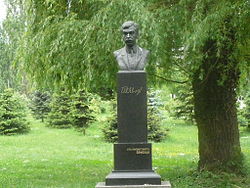
Monument of Peyo Yavorov in the Borisova gradina in Sofia, from the grateful Armenians. Image source: Wikipedia, Elena Chochkova, Creative Commons Attribution 3.0 Unported License.
From Wikipedia:
Peyo Yavorov (Bulgarian: Пейо Яворов; born Пейо Крачолов; January 1, 1878–October 17, 1914) was a Bulgarian Symbolist poet. He was considered to be one of the finest poetic talents of Bulgaria.
Most of his poems are romantic in subject, and dedicated to the two women in his life — Mina Todorova and Lora Karavelova. His first (and arguably greatest) love Mina died from tubercolosis, which greatly saddened Yavorov. She was buried in the Paris cemetery Père Lachaise.
Later on he met Lora, the daughter of statesman Petko Karavelov. They married, although Yavorov never loved her the way he loved Mina. The saved letters between Lora and Peyo proved their ardent and wild love.
Yavorov and Karavelova had a very turbulent marriage. Yavorov was very popular at that time and had many female admirers, which provoked Lora’s jealousy. They often had heated quarrels with Lora blaming Yavorov that he did not love her enough.
In November 1913 a fatal tragedy befell the family – after a quarrel Lora committed suicide. The same night Yavorov also made an attempt on his own life, and the bullet went through his temporal bone which left him almost blind. In despair over the trial provoked by Lora's death and the rumor that he had killed her, Yavorov poisoned and then shot himself on 29 October 1914, at the age of 36.

Yavorov Peak on Livingston Island in the South Shetland Islands, Antarctica is named after Peyo Yavorov.
One of Peyo Yavorov's most famous works (in Bulgarian and English), source: Slovo.bg:
Две хубави очи
Две хубави очи. Душата на дете
в две хубави очи; - музика - лъчи
Не искат и не обещават те...
Душата ми се моли,
дете,
душата ми се моли!
Страсти и неволи
ще хвърлят утре върху тях
булото на срам и грях.
Булото на срам и грях -
не ще го хвърлят върху тях
страсти и неволи.
Душата ми се моли,
дете,
душата ми се моли...
Не искат и не обещават те! -
Две хубави очи. Музика, лъчи
в две хубави очи. Душата на дете...
Two Beautiful Eyes
Two beautiful eyes. The soul of a child
In two beautiful eyes – music, rays.
They don’t want and they don’t promise...
My soul is praying,
Child,
My soul is praying!
Passions and miseries
Will throw tomorrow upon them
The veil of shame and sin
The veil of shame and sin
Will not throw upon them
Passions and miseries.
My soul is praying,
Child,
My soul is praying...
They don’t want and don’t promise!
Two beautiful eyes. Music, rays.
In two beautiful eyes. The soul of a child.
Yavorov from Bulgaria By Jonathan Bousfield, Dan Richardson, Rough Guides, Richard Watkins:
Video: Peyo Yavorov (in Bulgarian).
Related reading:
Пейо Яворов / Peyo Yavorov: The two women in his life. Facebook page.
Labels:
Bulgarian Poets,
Literature
Bulgarian Poets: Dimcho Debelyanov (Bulgarian: Димчо Дебелянов)
 From Wikipedia:
From Wikipedia:"Dimcho Debelyanov (Bulgarian: Димчо Дебелянов) (28 March 1887 - 2 October 1916) was a Bulgarian poet and author whose death in the First World War cut off his promising literary career. Born to a prosperous family in Koprivshtitsa, Bulgaria, he experienced hardship upon the death of his father in 1896, which necessitated the family moving to Plovdiv. Debelyanov always spoke of the eight years in Plovdiv with regret, calling it "the sorrowful city".
In 1906, he began to send poetry to Bulgarian literary magazines at the urging of Pencho Slaveikov, where he saw his first printed works, which were well received. He moved from job to job during the next six years, unable to settle and seeing employment as a junior clerk for the central meteorological station and as a freelance journalist, before joining the army in 1912 to fight in the Balkan Wars. In 1914 he was discharged from the army and took up a post in an office, a position he hated so much, that he rejoined the army in 1916, but was killed near Dolno and Gorno Karadjovo during a battle with an Irish division.
His body of work was collected by friends following his death and published in a two volume anthology with a collection of letters and personal writings. These became very popular in post-war Bulgaria, critics commenting that they reflect the poet remarkably well, being in a Symbolist style and thus unable to settle on a theme, focusing most closely on the presence of death and despair, creating a "gloomy melancholy" effect."
Image source: Dimcho Debelyanov. Portrait of Dimcho Debelyanov, exhibited in Debelyanov House, in Koprivshtitsa (Bulgaria), Wikipedia, public domain.
One of his most famous works (in Bulgarian):
Да се завърнеш в бащината къща (Return to father's house)
Да се завърнеш в бащината къща,
когато вечерта смирено гасне
и тихи пазви тиха нощ разгръща
да приласкае скръбни и нещастни.
Кат бреме хвърлил черната умора,
що безутешни дни ти завещаха -
ти с плахи стъпки да събудиш в двора
пред гостенин очакван радост плаха.
Да те присрещне старата на прага
и сложил чело на безсилно рамо,
да чезнеш в нейната усмивка блага
и дълго да повтаряш: мамо, мамо...
Смирено влязъл в стаята позната,
последна твоя пристан и заслона,
да шъпнеш тихи думи в тишината,
впил морен поглед в старата икона:
аз дойдох да дочакам мирен заник,
че мойто слънце своя път измина...
О, скрити вопли на печален странник,
напразно спомнил майка и родина!
Source:
Slovo.bg
Bukvite.bg

Image source: Tombstone of Dimcho Debelyanov (with a statue representing his mother), in Koprivshtitsa (Bulgaria). Wikipedia, public domain.
Dimcho Debelyanov's house from Google Books (scroll down the page):
Related reading (some references in Bulgarian):
Koprivshtitsa Things To Do.
Поетът Петър Велчев е носител на Националната литературна награда “Димчо Дебелянов”
Къща-музей Димчо Дебелянов
Къща-музей "Димчо Дебелянов"
Димчо Дебелянов (1887-1916г.)
Labels:
Bulgarian Poets,
Literature
Subscribe to:
Posts (Atom)
